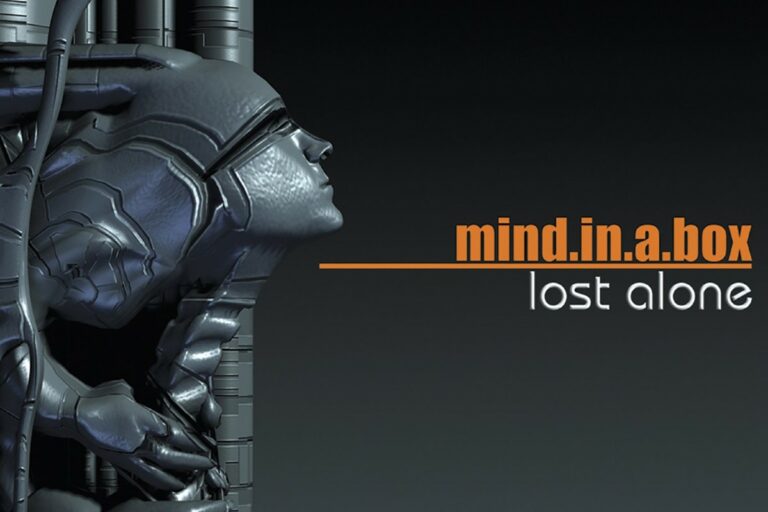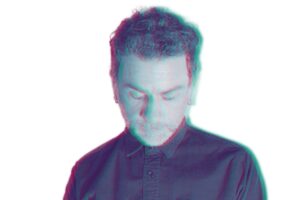I’m revisiting the mind.in.a.box catalog prior to the release of their eighth studio album, Black and White, which is due out August 30, 2023. mind.in.a.box is unique in that their albums form part of a cohesive storyline. Let’s get caught up.
Background behind Lost Alone
In 2004, mind.in.a.box released their debut album, Lost Alone. The project formed two years earlier in Vienna, Austria, by two childhood friends and computer geeks, Stefan Poiss and Markus Hadwiger. Stefan, a video game soundtrack composer, produces the music and performs the vocals. Markus develops the storyline and writes all of the lyrics.
Lost Alone arrived at a time when futurepop dominated the dark music scene, and mind.in.a.box often gets lumped in with those artists. The same year saw classic releases from Seabound, Assemblage 23, and Icon of Coil. Yet miab overcomes easy comparisons to futurepop. The production includes techno and ambient sounds, and the beats often hover in a mid-tempo range, making for contemplative headphone listening rather than crushing a dancefloor.
The debut album introduced the elements that would come to define mind.in.a.box albums for the next two decades. There’s the cohesive storyline, of course, comprised of characters that appear in each album. Stefan uses vocal effects, heavily mutating his voice to portray those characters and the emotional elements in the storyline. Spoken-word tracks introduce “evidence” that propels the storyline forward.
How the mind.in.a.box storyline progresses
Lost Alone introduces the primary characters in the storyline, though they’re not named just yet. We do know that they’ll represent light and dark.
There’s a prevailing sense of loneliness across the entire album. The main character awakens, lost and alone. He doesn’t know where he is, and he doesn’t remember what came before. Loneliness eats at him, as he ponders what came before. He wonders if he was ever happy. Bits of memories begin to appear, including a relationship that may have ended badly.
On the project’s first evidence track—a series of frantic phone calls—we learn that shady characters have bugged our protagonist, and they’re watching him closely. They have a plan for him, but they’re concerned that he’s looking for a mysterious woman. At one point, they consider taking him out.
On the second evidence track, something goes wrong. The trace they’ve placed on the protagonist has gone dead and they’ve lost track of him. They sack his hotel room and find a slip of paper containing the address of a bar. At the bar, they find the protagonist’s body on the floor. He’s “switched over” to another place using some mysterious equipment, his data erased. They abort their plans.
Lost in this other place, the protagonist questions his decision.
What the critics said about Lost Alone
Release Magazine: “The name mind.in.a.box might sound like a poor imitation of Cut.rate.box, but this German debutant sounds different. Dark, epic song structures and peculiar, processed vocals mixed with techno rhythms is what this is all about. Some futurepop elements are included, but this is not your standard fare. I quite like the album, although it has no real highs or lows, rather it kind of stays in the middle ground all the time, which is a shame. The songs miss memorable hooks.” (Full review)
Sputnik Music: “Lost Alone, in my humble opinion, is possibly the most decisive futurepop album, and for good reason; this album really creates the sound of the future with twinkling synthesizers, robotic yet strangely alluring vocal snippets, and a slew of heart touching lyrics about personal issues, love, death, and everything in between. That’s just it though; mind.in.a.box has the distinct ability to create music that sounds so organic and beautiful rather than ‘mechanical’ and cold.” (Full review)
Lost Alone’s standout track
According to Spotify numbers, “Change” is by far the most popular track from Lost Alone. For good reason. This song exemplifies mind.in.box’s best assets: the intriguing robotic voices, dynamic electronics, emotionally charged lyrics.
Around the 90-second mark, “Change” drops a heavy beat and takes an unexpected turn. The vocals shift pitch on the next verse: “I am the one who cries out at night for somebody to change my weary core.” It’s easy to place these lyrics in the context of the storyline about our protagonist losing himself. But it works just as well as a standalone song about mental health and personal isolation.






